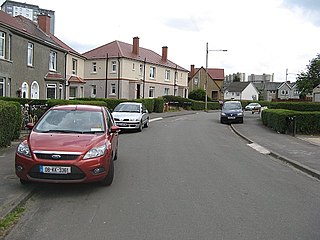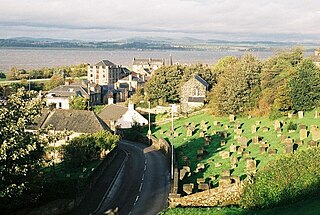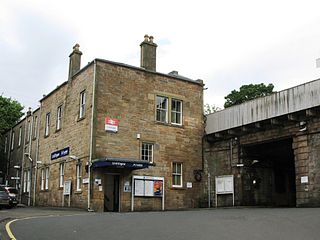
Cardonald is an outlying suburb of the Scottish city of Glasgow. Formerly a village in its own right, it lies to the southwest of the city and is bounded to the south by the White Cart Water. The area was part of Renfrewshire until 1926 when the villages of Cardonald, Crookston, Halfway and their surrounding farmland were annexed to Glasgow.

West Lothian is one of the 32 council areas of Scotland, bordering the City of Edinburgh council area, Scottish Borders, South Lanarkshire, North Lanarkshire and Falkirk. The modern council area was formed in 1975 when the historic county of West Lothian, also known as Linlithgowshire, was reshaped substantially as part of local government reforms; some areas that had formerly been part of Midlothian were added to a new West Lothian District within the Region of Lothian, whilst some areas in the north-west were transferred to the Falkirk District and areas in the north-east were transferred to the City of Edinburgh District. In 1996 West Lothian became a unitary authority area, using the same name and territory as in 1975.

Borrowstounness, commonly known as Bo'ness, is a town and former burgh and seaport on the south bank of the Firth of Forth in the Central Lowlands of Scotland. Historically part of the county of West Lothian, it now lies within the Falkirk council area, 17 miles northwest of Edinburgh and 6+3⁄4 miles east of Falkirk. At the 2011 census, the population of Bo'ness was 15,100.

Imperial Brands plc is a British multinational tobacco company headquartered in London and Bristol, England. It is the world's fourth-largest international cigarette company measured by market share after Philip Morris International, British American Tobacco and Japan Tobacco and the world's largest producer of fine-cut tobacco and tobacco papers.
The Scottish Open is a ranking professional snooker tournament held in the United Kingdom. The tournament had many name changes in its history, as the tournament was formerly called International Open, Matchroom Trophy and Players Championship. Apart from a hiatus in the 1990/1991 and 1991/1992 seasons, the tournament remained a ranking event until 2003/2004. In the 2012/2013 season the tournament was added back to the calendar as part of the Players Tour Championship minor-ranking series.

The Union Canal, full name the Edinburgh and Glasgow Union Canal, is a canal in Scotland, running from Falkirk to Edinburgh, constructed to bring minerals, especially coal, to the capital. It was opened in 1822 and was initially successful, but the construction of railways, particularly the Edinburgh and Glasgow Railway, which opened in 1842, diminished its value as a transport medium. It fell into slow commercial decline and was closed to commercial traffic in 1933. It was officially closed in 1965. The canal is listed as three individual scheduled monuments by Historic Scotland according to the three former counties, Midlothian, West Lothian and Stirlingshire, through which it flows.

This article deals with the history of the city of Glasgow, Scotland.

Springburn is an inner-city district in the north of the Scottish city of Glasgow, made up of generally working-class households.

The Mitchell Library is a large public library located in the Charing Cross area of Glasgow, Scotland. It is the largest public reference library in Europe, and the centre of Glasgow's public library system.

Kinning Park is a southern suburb of Glasgow, Scotland. It was formerly a separate police burgh between 1871 and 1905 before being absorbed by the city. In 1897, it had a population of 14,326.

Linlithgow railway station is a railway station serving the town of Linlithgow in West Lothian, Scotland. It is located on the Glasgow to Edinburgh via Falkirk Line, and is also served by ScotRail services from Edinburgh Waverley to Dunblane.

Falkirk High railway station is one of two railway stations serving the town of Falkirk in Scotland. It is on the Glasgow to Edinburgh via Falkirk Line and situated on the southern edge of the town, close to the Union Canal.

Linlithgow is a town in West Lothian, Scotland. It was historically West Lothian's county town, reflected in the county's historical name of Linlithgowshire. An ancient town, it lies in the Central Belt on a historic route between Edinburgh and Falkirk beside Linlithgow Loch. The town is situated approximately 20 miles (32 km) west of Edinburgh.

The Empire Exhibition was an international Exhibition held at Bellahouston Park in Glasgow, Scotland, from May to December 1938.

George Husband Baird FRSE FSAScot was a Scottish minister, educational reformer, linguist and the Principal of the University of Edinburgh from 1793 to 1840. In 1800 he served as Moderator of the Church of Scotland General Assembly.
Steven Mitchell, Steve Mitchell, or Stephen Mitchell may refer to:
Churchman's was a British cigarette manufacturer based in Ipswich, Suffolk. The company was a subsidiary of John Player & Sons of Imperial Tobacco Co. Churchman was notable for producing one million cigarettes a day.
Events from the year 1911 in Scotland.
Stephen Mitchell was a Scottish tobacco manufacturer and philanthropist. He was the founder of the Mitchell Library, in Glasgow, Lanarkshire, Scotland, one of the earliest public reference libraries in Europe. Succeeding his father in business, Mitchell was Director of Stephen Mitchell & Son for approximately 38 years, and was a significant figure in 19th-century tobacco manufacturing, then one of the largest industries in the West of Scotland.
Robert Peter was an American politician, merchant, and landowner who served as the first mayor of Georgetown, Maryland.













